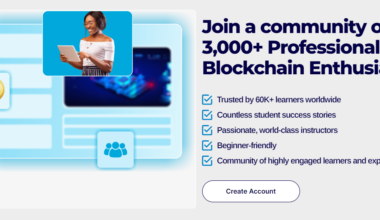Graduation represents the end of one chapter and the beginning of another for many college students. The transition from college to the workforce may be both exciting and challenging, and it is vital to be prepared.
The labor market is competitive, and finding a position that meets your professional goals and interests may take some effort. However, with the right preparation, you can increase your chances of success and set yourself up for a fulfilling and rewarding career.
This requires a proactive approach to building the skills, knowledge, and professional network needed to succeed in the workforce. From understanding the job market to developing transferable skills, there are many steps you can take to ensure a smooth transition from college to the workforce.
Assessing Career Goals And Developing A Plan
Assessing career goals and developing a plan is an essential first step in preparing for a successful transition from college to the workforce. It’s important to take the time to think about what you want to achieve in your career and what your long-term goals are.
This may involve researching different industries and job roles, as well as considering factors such as work-life balance, location, and compensation. Once you clearly understand your career goals, you can begin to develop a plan for achieving them.
One of the key elements of preparing for the workforce is selecting undergraduate college programs that align with your career goals. This means studying the various programs available, considering your strengths and weaknesses, and selecting a program that provides the right balance of theoretical and practical learning.
For example, suppose you are interested in a career in computer science. In that case, a degree in computer science or a related field will give you the technical skills and knowledge needed to succeed in the industry. However, if you are more interested in business, a degree in business or entrepreneurship might be a better fit.
For students, it might also benefit from studying and finding unique fields that are bound for massive growth but still are in nascent stages. For example, recently Biden administration decided to invest more than 280 Billion dollars into RnD and develop infrastructure around building silicon chips right in the USA. Micron Company is investing more than 100 billion dollars into just a single factory over the next two decades.
Are their jobs available for you in these large long-term investments? Does your skill set contribute to projects in which the government is most interested?
Whether you are looking to advance in your current career or seeking a new opportunity, a well-crafted plan will help you achieve your goals and set yourself up for success.
Also Read: 6 Benefits of Getting a Postgraduate Degree
Developing Transferable Skills Such As Communication, And Leadership
Developing transferable skills is another important aspect of preparing for a successful transition from college to the workforce. Transferable skills are abilities that are valued by employers across industries and can be applied to a wide range of job roles. Some of the most important transferable skills include communication, problem-solving, and leadership.
Effective communication is a critical skill that employers highly value. This includes being able to effectively articulate your ideas, listen to and understand others, and collaborate effectively with team members. College gives countless opportunities to improve communication skills through courses, group projects, and presentations.
Employers very highly value problem-solving abilities. This involves being able to analyze complex situations, identify challenges, and develop creative and effective solutions. College programs in science, technology, engineering, and mathematics (STEM) often emphasize problem-solving skills, but these skills can be developed and honed in any discipline.
Leadership skills are another important transferable skill that employers highly value. This includes the ability to motivate and inspire others, as well as the ability to effectively manage teams and projects. The college provides numerous opportunities to develop leadership skills through involvement in student organizations, internships, and volunteer work.
Relevant Work Experience Through Internships And Co-Op Programs
Gaining relevant work experience through internships and co-op programs is a key component of preparing for a successful transition from college to the workforce. These programs provide students with the opportunity to gain hands-on experience in their field of study and to apply what they have learned in the classroom to real-world situations.
Internships are often short-term, paid, or unpaid engagements that provide students with hands-on experience in their field of study. They provide students with a chance to work with seasoned experts and learn about a company’s day-to-day activities and develop practical skills that employers highly value.
Co-op programs are similar to internships, but they are typically longer in duration and may involve rotations through different departments within a company. These programs offer students a more comprehensive experience and the opportunity to gain a broader understanding of a company and its operations.
Both internships and co-op programs offer students the opportunity to make valuable connections with professionals in their field, gain valuable work experience, and increase their chances of success in their future careers.
Conclusion
Preparing for a successful transition from college to the workforce requires a multi-faceted approach. Assessing career goals and developing a plan, staying up-to-date with industry trends and current events, developing transferable skills such as communication, problem-solving, and leadership, and gaining relevant work experience through internships and co-op programs are all crucial components of preparing for a successful transition.
By taking these steps, college students can increase their chances of success in their future careers and build a strong foundation for their professional lives. They will be equipped with the skills, knowledge, and experience necessary to navigate the competitive job market and succeed in their chosen careers.
